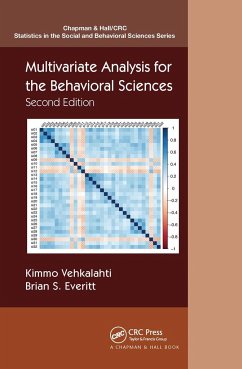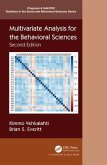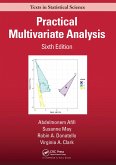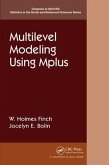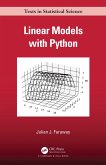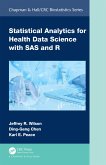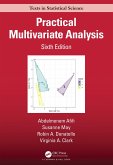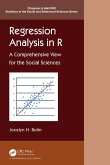Multivariate Analysis for the Behavioral Sciences, Second Edition is designed to show how a variety of statistical methods can be used to analyse data collected by psychologists and other behavioral scientists. Assuming some familiarity with introductory statistics, the book begins by briefly describing a variety of study designs used in the behavioral sciences, and the concept of models for data analysis. The contentious issues of p-values and confidence intervals are also discussed in the introductory chapter.
After describing graphical methods, the book covers regression methods, including simple linear regression, multiple regression, locally weighted regression, generalized linear models, logistic regression, and survival analysis. There are further chapters covering longitudinal data and missing values, before the last seven chapters deal with multivariate analysis, including principal components analysis, factor analysis, multidimensional scaling, correspondence analysis, and cluster analysis.
Features:
Presents an accessible introduction to multivariate analysis for behavioral scientists
Contains a large number of real data sets, including cognitive behavioral therapy, crime rates, and drug usage
Includes nearly 100 exercises for course use or self-study
Supplemented by a GitHub repository with all datasets and R code for the examples and exercises
Theoretical details are separated from the main body of the text
Suitable for anyone working in the behavioral sciences with a basic grasp of statistics
After describing graphical methods, the book covers regression methods, including simple linear regression, multiple regression, locally weighted regression, generalized linear models, logistic regression, and survival analysis. There are further chapters covering longitudinal data and missing values, before the last seven chapters deal with multivariate analysis, including principal components analysis, factor analysis, multidimensional scaling, correspondence analysis, and cluster analysis.
Features:
Presents an accessible introduction to multivariate analysis for behavioral scientists
Contains a large number of real data sets, including cognitive behavioral therapy, crime rates, and drug usage
Includes nearly 100 exercises for course use or self-study
Supplemented by a GitHub repository with all datasets and R code for the examples and exercises
Theoretical details are separated from the main body of the text
Suitable for anyone working in the behavioral sciences with a basic grasp of statistics
Praise for the first edition:
Clarity and conciseness have always been the hallmarks of Everitt's writing. This book is no exception. Anyone looking for a clearly written text on the subject that is also practitioner oriented needs to look no further.
-Chuck Chakrapani, Journal of the Royal Statistical Society, Series A, 2012
... a clear, well-orchestrated guide to multivariate statistics for the post-graduate and professional behavioural scientist who possesses basic statistical knowledge. ... Everitt successfully crafts a well-integrated introductory text that obviates potential difficulties by including real problems and their data sets. ... the book's applied orientation introduces the behavioural scientist to both the use and rudimentary understanding of multivariate techniques. ... The book would also serve well as a training guide for the practitioner less experienced in multivariate techniques. ...
-Psychometrika, June 2010
... The first two chapters give a magnificent introduction before approaching the modeling issues. Especially the second chapter, which shows how to look at data, is among the best I have ever seen in books on multivariate methods. ... He also goes well beyond the typical graphs showing how to explore real insights of the data. ... the book is extremely easy to browse and read. ... Putting the R code in an appendix and on the website is an excellent choice. ... the huge experience of the author ... makes the presentation so clear and understandable. I'll be happy to recommend this book to students and researchers.
-International Statistical Review, 2010
"Since there is always a shortage of multivariate statistical texts, it was uplifting to see a potential new text for the multivariate curriculum. As the authors state, this text goes far beyond the typical multivariate statistics text for psychologists or even statisticians. The text covers the spectrum of multivariate analysis (regressions, principa
Clarity and conciseness have always been the hallmarks of Everitt's writing. This book is no exception. Anyone looking for a clearly written text on the subject that is also practitioner oriented needs to look no further.
-Chuck Chakrapani, Journal of the Royal Statistical Society, Series A, 2012
... a clear, well-orchestrated guide to multivariate statistics for the post-graduate and professional behavioural scientist who possesses basic statistical knowledge. ... Everitt successfully crafts a well-integrated introductory text that obviates potential difficulties by including real problems and their data sets. ... the book's applied orientation introduces the behavioural scientist to both the use and rudimentary understanding of multivariate techniques. ... The book would also serve well as a training guide for the practitioner less experienced in multivariate techniques. ...
-Psychometrika, June 2010
... The first two chapters give a magnificent introduction before approaching the modeling issues. Especially the second chapter, which shows how to look at data, is among the best I have ever seen in books on multivariate methods. ... He also goes well beyond the typical graphs showing how to explore real insights of the data. ... the book is extremely easy to browse and read. ... Putting the R code in an appendix and on the website is an excellent choice. ... the huge experience of the author ... makes the presentation so clear and understandable. I'll be happy to recommend this book to students and researchers.
-International Statistical Review, 2010
"Since there is always a shortage of multivariate statistical texts, it was uplifting to see a potential new text for the multivariate curriculum. As the authors state, this text goes far beyond the typical multivariate statistics text for psychologists or even statisticians. The text covers the spectrum of multivariate analysis (regressions, principa

